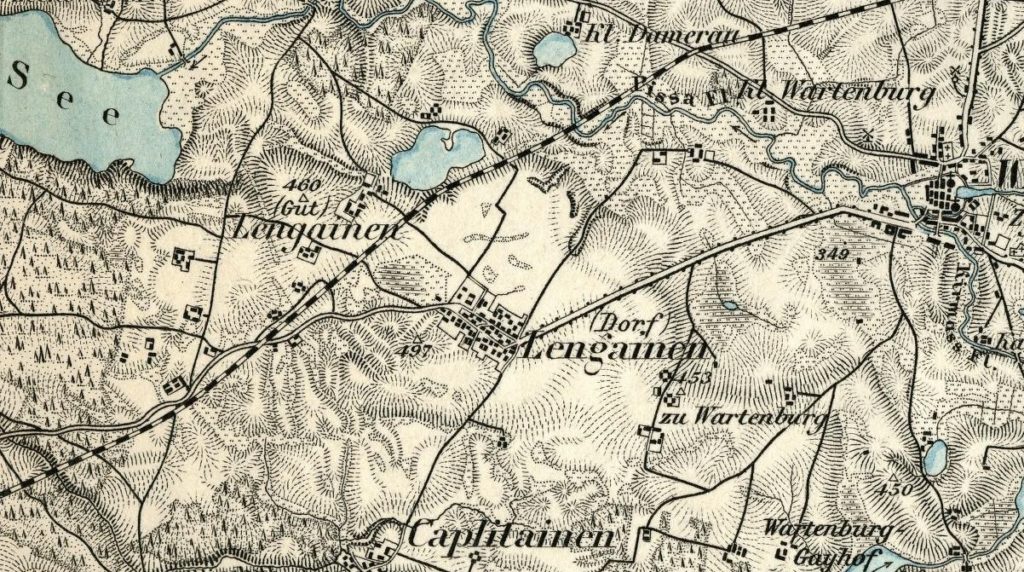
Wie so viele andere Dinge war der Hof, auf dem Cilly und Franz geboren wurden, lange Zeit ein abstrakter Ort für mich. Ich hatte Fotos davon gesehen, von einem Bauernhof auf einer kleinen Anhöhe mit einem Haupthaus und zwei Scheunen und einigen Bäumen im Hof, Fotos von Hochzeiten vor den roten Backsteinscheunen, von meiner Großmutter, die mit Freunden und Familienmitgliedern an einem See saß . Mein Vater hat sogar eine Zeichnung angefertigt, die auf einem kleinen Foto basiert, und diese hing im Wohnzimmer meiner Großeltern an der Wand, solange ich mich erinnere.
Ich wusste ungefähr, wo der Hof gewesen war, oder vermutete es zumindest, basierend auf den Fotos und den alten Karten von Lengainen/Łęgajny. Aber in all den Jahren habe ich den genauen Ort nie gefunden.
Das ist jetzt anders. Achtzig Jahre genau nach dem Tag, an dem die Wehrmacht, die Luftwaffe und die Marine Polen angriffen, 130 Menschen bei der Bombardierung von Wieluń töteten und versuchten, die Verteidiger der Westerplatte zur Kapitulation zu schießen, fuhren meine Stiefmutter, mein Vater und ich nach Kaplitainen/Kaplitiny. Dorfvorsteherin Krystyna Szter aus Kaplitny hatte versprochen, einige Informationen für mich zu finden – schließlich wusste ich, dass ich dort einige Familienmitglieder hatte, die nach dem Ehemann benannte Schnarbach-Seite der Familie von meiner Omas Schwester Luzie, Franz Schnarbach. Aber ich hatte nicht erwartet, was als nächstes geschah: Ich hatte Informationen erwartet, vielleicht über Gebäude oder andere Orte, die mit den Familien Nerowski, Barrabasch oder Schnarbach zu tun hatten. Aber stattdessen traf ich Verwandte, von denen ich nicht einmal wusste, dass sie existierten. Krystyna hatte mit Stefan Schnarbach, dem Sohn von Luzie und meinem Großcousin, und seinem Neffen Stefan Markiewicz Kontakt aufgenommen.
Und dann stand ich unter dem Pflaumenbaum im Dorfzentrum von Kaplitainen/Kaplityny und war sprachlos. Mein Vater hat dann aber ein Gespräch fortsetzen konnte, das er zuletzt in den 70er Jahren mit Stefan in Westdeutschland geführt hatte, als dieser seine Tante Cilly besuchte, und Lothar ihn stolz zu C & A bringen musste. Mit Übersetzungshilfe von Kornelia Kurowska von der Stiftung Borussia haben wir es dann bei bei Kaffee und Kuchen, serviert von Stefans Frau Elżbieta, geschafft, Familiendetails und -verbindungen zu klären.
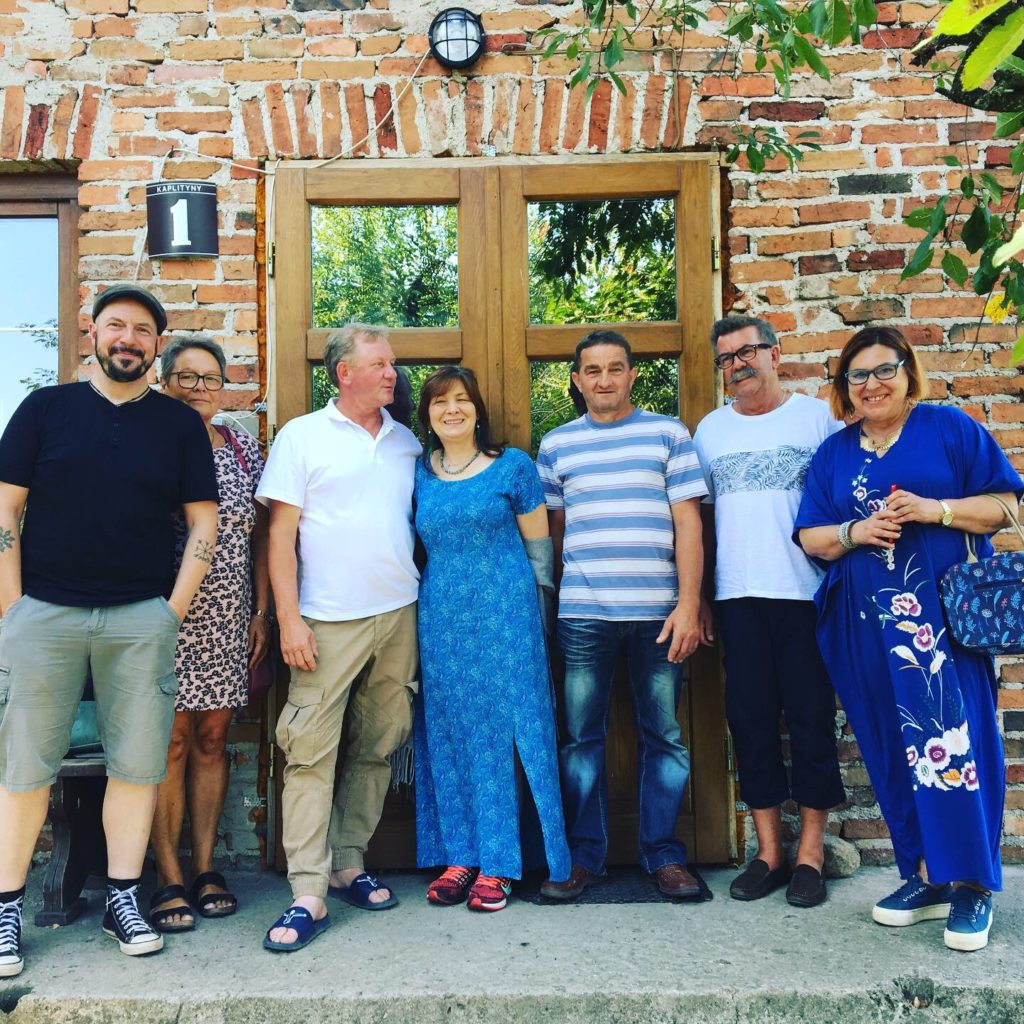
Es gab einen Moment des Unbehagens, oder vielleicht fühlte nur ich so, als wir begannen, über den Hof und über das, was mit dem Land passierte, zu sprechen. Es war eine fast klischeehafte Situation, die sich hier und im ehemaligen Pommern und Schlesien in den letzten 30 Jahre oft abgespielt haben muss: eine Gruppe von Deutschen aus dem Westen, die in einem polnischen Haushalt saßen und sich erkundigten, was mit dem Haus und dem Land passiert war. Auf der anderen Seite sind mein Vater und ich Menschen, die absolut keine Ahnung vom ländlichen Leben und den praktischen Aspekten der Arbeit auf einem Bauernhof haben und sich nur fragten, ob dieses Land, von dem wir so viel gehört hatten, wirklich existierte und nicht nur eine Erfindung von Cilly gewesen ist, um ihr den Abschied von der Heimat zu erleichtern.
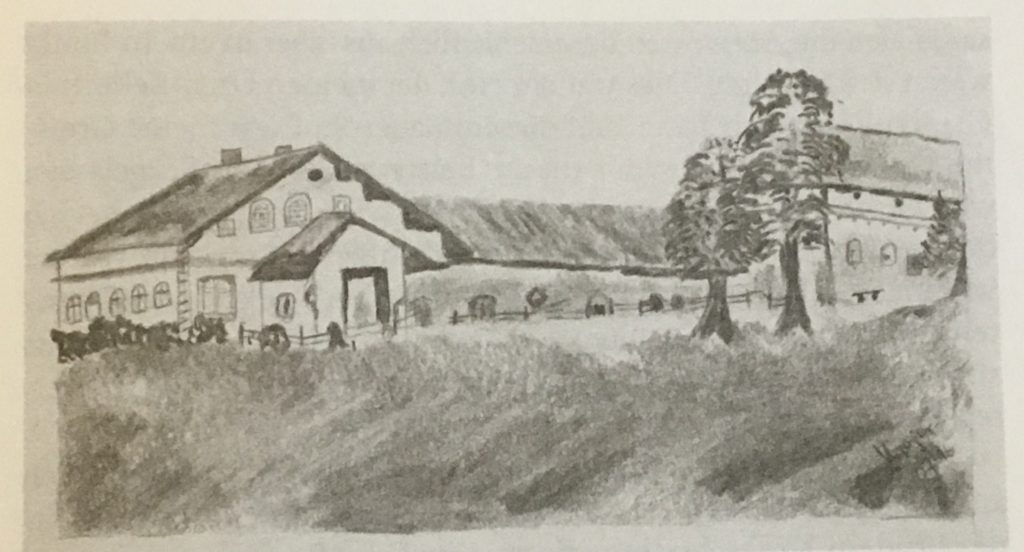
Aber dieser Moment verging schnell, bei mehr Kaffee und Kuchen, und ausgetauschten Bilder von Hochzeiten in den 30er Jahre und Fotos von Kindern und Enkelkindern, und bei Tränen, die mein Vater über die Wärme und Gastfreundschaft vergoss, die wir erlebten – und über die Tatsache, dass wir nette Menschen gefunden hatten, die uns tatsächlich mit dem Land hier verbanden.
Wir machten uns dann auf den Weg nach Lengainen/Łęgajny, wo Stefan und Stefan uns auf eine abenteuerliche Fahrt durch den Wald mitnahmen genau zu der Stelle, an der das Haus von Cilly und Franz und Lucie und Otti und Bruno und Monie und Otto gestanden hatte. Dank der Roten Armee ist nicht mehr übrig als ein Loch, dort, wo sich einst der Keller befand, und ein paar zertrümmerte rote Ziegelsteine, die in dem Wäldchen verstreut waren, das aus den paar Bäumen im Hof entstanden war. Genau die Bäume, die mein Vater gezeichnet hatte. Und so konnte ich ein Lebewesen berühren, das schon existierte, als Franz und Cilly hier auf dem Hof ein- und ausgingen, als Kinder gespielt hatten und vielleicht, genau wie ich jetzt, die Rinde der Bäume berührten.
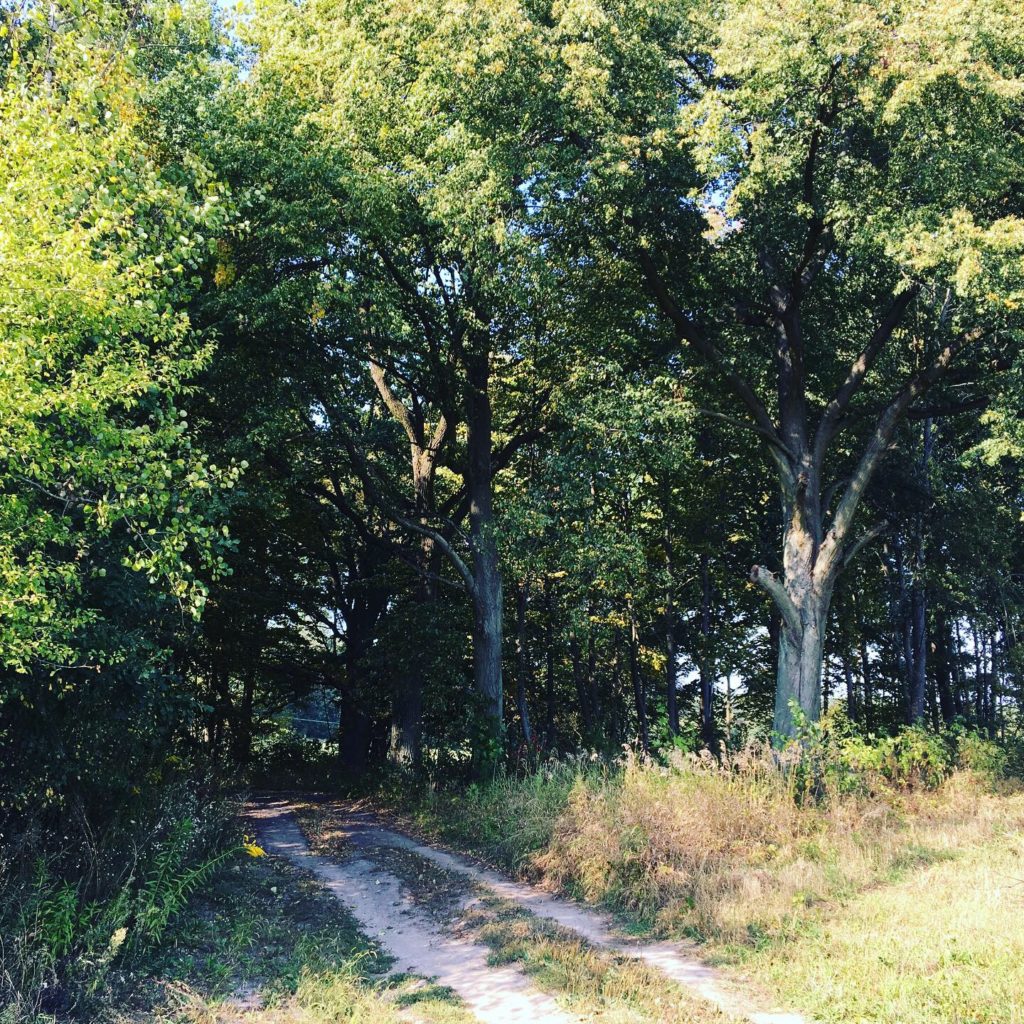
Cilly and Franz: Heimat?
Like so many other things, the family farm where both Cilly and Franz were born was, for a long time, an abstract thing. I had seen pictures of it, of a farm on a small rise with a main house and two barns and some trees in the yard, of weddings in front of the red brick barns, of my grandmother sitting by a lake with friends and family members. My dad even made a drawing of if based on a small picture as a present for my grandmother, and I hang on the wall in the living room as long as I remember.
I knew roughly where it had been, or at least suspected that based on the images and the old Lengainen maps I’ve seen. But I never found the exact spot.
All that has changed. Eighty years to the day that the Wehrmacht and Luftwaffe and Marine attacked Poland, killed 130 people bombing Wieluń and tried to blast the defenders of Westerplatte into surrendering, my step mum and my dad and I went to Kaplitiny. Village leader Krystyna Szter had promised to find some information for me – after all I knew that I had some family members there, the Schnabach side of the family named after the husband of my granny’s sister Luzie, Franz Schnabach. But I did not expect what happened next: I had expected some information perhaps about buildings or other places that were related to the Nerowskis, Barrabasch‘ or Schnabach families; instead I met blood relatives of mine that I didn’t know even existed. Krystyna had contacted Stefan Schnabach, son of Luzie and my great-cousin and his nephew Stefan Markieviecz.
So there I stood under the plum tree in the village center of Kaplityny and was speechless. Good thing my dad could continue a conversation he last had with Stefan in West Germany in the 70s, when Stefan visited his aunt Cilly and Lothar had to take him to C&A. So with the help of Kornelia Kurowska from the Borussia Foundation we managed to sort out family details and – connections over coffee and cake served by Stefan’s wife Elżbieta.
There was a moment of unease, or maybe I just felt like it, when we started talking about the farm of my grandmother and what happened to the land: on the one hand here was an almost stereotypical situation that must have played out often across Pomerania, Silesia and former East Prussia in the years and decades after 1989 – a bunch of Germans from the west sitting in a Polish household and enquiring about what happened to the house and the land, maybe with a slight undertone of accusation or threat of taking the land back. On the other hand I guess here were my dad and me, two people completely removed from any rural life and the practicalities of working on a farm just wondering if that land that we heard so much really existed and was not just a figment of imagination that Cilly had invented to make her parting from her homeland more easy for her.
But that moment quickly passed, over more coffee and slices of cake, exchanged pictures of children and grand children, and about the tears my father shed over the warmth and hospitality we encountered and about the fact that we found lovely people connecting us to the land.
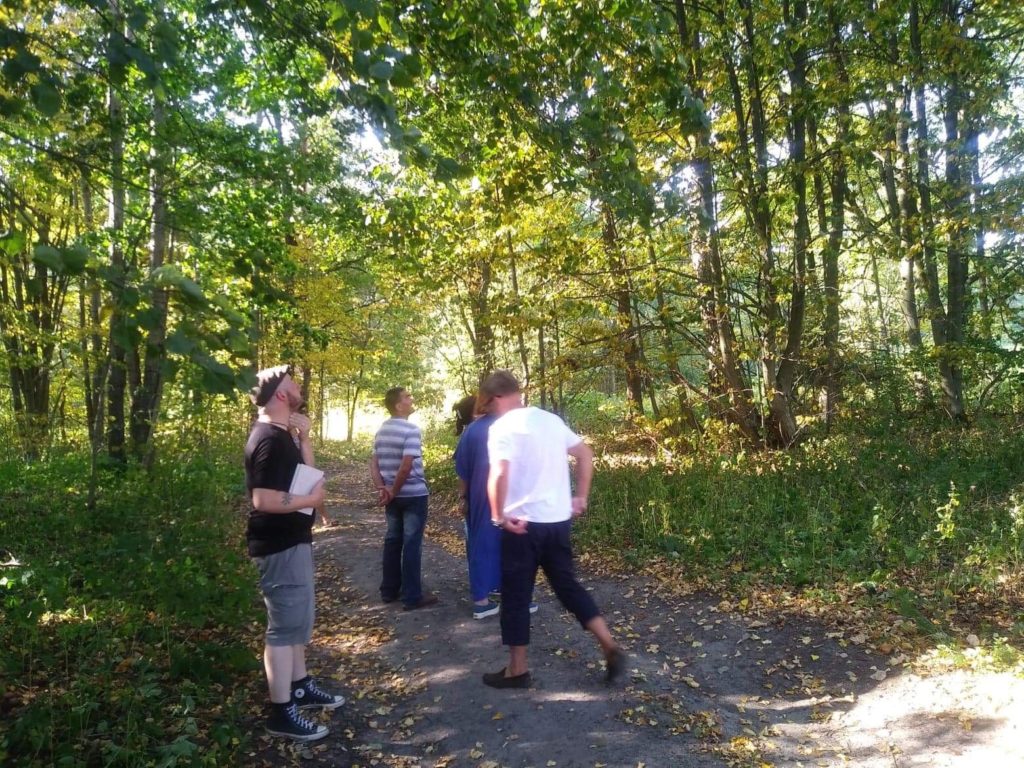
We then set out to Łęgajny, where Stefan and Stefan took us on an adventurous drive through the forest and to the exact spot that the house of Cilly and Franz and Lucie and Otti and Bruno and Moon and Otto had stood. Thanks to the Red Army nothing is left except a whole where the basement once was, and a few smashed red bricks strewn around a grove. What was still standing however were the trees my dad had drawn based on that picture. And so I could touch a living being that had been around when Franz and Cilly played around it maybe, and touched its bark like I did now.
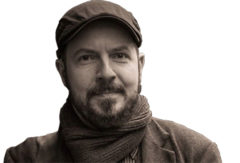

Hallo Marcel,
Für mich sind die Tage in Mutters Heimat sehr emotional gewesen.
Ich hätte nie gedacht ,die in vielen Erzählungen dargestellte,Situationen nacherleben zu können.
Das Bad im See,gemeinsames Singen von Mutter mit deinem Ur Opa bei der
Feldarbeit und weitere Impressionen sind ganz spontan und mächtig in diesem schönen Land entstanden.
Danke für dein Engagement,dank auch an deine „Betreuung „.
Es wird immer unvergesslich bleiben.
Papa